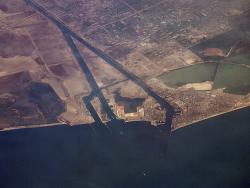
The idea of creating a canal linking the Mediterranean Sea to the Red Sea is a very old one that dates back about 4000 years to the ancient Egyptians. They thought of linking the two seas by using the River Nile and its branches. It was this very old desire that led to the digging of the present Suez Canal.
The building of the Suez Canal was considered the greatest engineering feat of the nineteenth century. Historically, it the first man-made canal ever dug in service of world trade, and when it opened in 1869, the Canal was the longest man-made sea level canal in the world.
At its opening, the Canal was 164 km long, had a water depth of 7.5 m, and could handle a maximum tonnage of 5,000 D.W.T. Over the years it has been improved in order to cope with the development in the international fleet and to serve world trade. By the year 2001, the Canal was 190.25 km long, had a water depth of 22.5 m, and could handle a maximum tonnage of 210,000 D.W.T.
The modern Suez Canal is still one of the world's most heavily used shipping-routes and continues to play a critical role in international trade.
Resources
- Hallberg, Charles W. The Suez Canal, Its History and Diplomatic Importance, Octagon Books, 1974.
- Karabell, Zachary. Parting the Desert: the Creation of the Suez Canal, New York: Knopf, 2003.
- Marlowe, John. The World Ditch: the Making of the Suez Canal, New York: Macmillan, 1964.


